|
|
|
Sort Order |
|
|
|
Items / Page
|
|
|
|
|
|
|
| Srl | Item |
| 1 |
ID:
142874
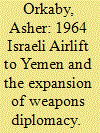

|
|
|
|
|
| Summary/Abstract |
Based on oral history accounts of surviving members of Israel[#x02019]s first International Squadron and organisers of the military airlift to Yemen in 1964, this analysis examines the origins of the squadron, its mission to Yemen, and its impact on Israeli foreign policy in Africa. The founding of the International Squadron in 1963 incorporated the Boeing 377 Stratocruiser into the Israeli air force and gave the military and Foreign Ministry the country[#x02019]s first long-distance transport capability. The initial successful military airlift to Yemen in May 1964 opened the possibility for additional clandestine military aid missions to sub-Saharan Africa and Kurdistan and marked the beginning of an era of Israeli [#x0201C]weapons diplomacy.[#x0201D] The Squadron[#x02019]s incorporation of more advanced transport planes during the 1970s presented the Foreign Ministry with the capability of reaching Latin America and Asia, an essential factor in Israel[#x02019]s expanding global arms market and later humanitarian missions.
|
|
|
|
|
|
|
|
|
|
|
|
|
|
|
|
| 2 |
ID:
111690
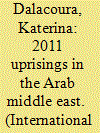

|
|
|
|
|
| Publication |
2012.
|
| Summary/Abstract |
The Arab uprisings of 2011 are still unfolding, but we can already discern patterns of their effects on the Middle East region. This article offers a brief chronology of events, highlighting their inter-connections but also their very diverse origins, trajectories and outcomes. It discusses the economic and political grievances at the root of the uprisings and assesses the degree to which widespread popular mobilization can be attributed to pre-existing political, labour and civil society activism, and social media. It argues that the uprisings' success in overthrowing incumbent regimes depended on the latter's responses and relationships with the army and security services. The rebellions' inclusiveness or lack thereof was also a crucial factor. The article discusses the prospects of democracy in the Arab world following the 2011 events and finds that they are very mixed: while Tunisia, at one end, is on track to achieve positive political reform, Syria, Yemen and Libya are experiencing profound internal division and conflict. In Bahrain the uprising was repressed. In Egypt, which epitomizes many regional trends, change will be limited but, for that reason, possibly more long-lasting. Islamist movements did not lead the uprisings but will benefit from them politically even though, in the long run, political participation may lead to their decline. Finally, the article sketches the varied and ongoing geopolitical implications of the uprisings for Turkish, Iranian and Israeli interests and policies. It assesses Barack Obama's response to the 2011 events and suggests that, despite their profound significance for the politics of the region, they may not alter the main contours of US foreign policy in the Middle East in a major way.
|
|
|
|
|
|
|
|
|
|
|
|
|
|
|
|
| 3 |
ID:
115492


|
|
|
| 4 |
ID:
179481


|
|
|
|
|
| Summary/Abstract |
In late March 2015, Saudi o5cials came to the Obama administration with a message: Saudi Arabia and a coalition of partners were on the verge ofintervening in neighboring Yemen, whose leader had recently been ousted by rebels. This wasn’t exactly a bolt from the blue. The Saudis had been 4agging their growing concerns about the insurgency on their southern border for months, arguing that the rebels were proxies for their archrival, Iran.
|
|
|
|
|
|
|
|
|
|
|
|
|
|
|
|
| 5 |
ID:
147235


|
|
|
|
|
| Summary/Abstract |
ON 3 NOVEMBER 2015, UNDER THE WATCHFUL EYES of Saudi King Salman and Sudanese President Omar Al-Bashir, their respective finance ministers, Ibrahim Al-Assaf and Badredin Mahmoud, signed four agreements that committed the kingdom to funding three big dam projects in Sudan, as well as the cultivation and irrigation of more than a million acres near already-constructed dams on Sudanese territory.1 These framework accords were expanded upon when, in February 2016, Al-Assaf travelled to Khartoum to meet Mutaz Musa, Minister of Water Resources and Electricity and head of Sudan's hugely powerful Dam Implementation Unit. Ignoring the howls of anti-dam protesters assaulted by security forces, Al-Assaf committed US$5 billion in dam project finance to Sudan, which has struggled to revive economic growth following the secession of South Sudan in 2011 and the loss of three-quarters of its oil production. The multi-billion dollar promises are a quid pro quo for the participation of the Sudanese Armed Forces since March 2015 in the devastating war waged in Yemen against Houthi insurgents by King Salman and his 30-year-old Deputy Crown Prince, Mohammad.
|
|
|
|
|
|
|
|
|
|
|
|
|
|
|
|
| 6 |
ID:
133916


|
|
|
|
|
| Publication |
New Delhi, Penguin Books India Pvt Ltd, 2014.
|
| Description |
xi, 403p.Pbk
|
| Standard Number |
9780241003787
|
|
|
|
|
|
|
|
|
|
|
|
Copies: C:1/I:0,R:0,Q:0
Circulation
| Accession# | Call# | Current Location | Status | Policy | Location |
| 057875 | 923.4/STO 057875 | Main | On Shelf | General | |
|
|
|
|
| 7 |
ID:
164396
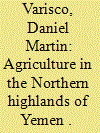

|
|
|
|
|
| Summary/Abstract |
The most fertile part of the Arabian Peninsula is the southwestern corner known historically as Yemen. The primary occupation of Yemen’s tribes over the centuries has been sedentary agriculture, stemming back to the pre-Islamic South Arabian kingdoms. Up until the revolution that toppled the Zaydī imamate in 1962, agricultural activities had change little over the centuries. After the revolution and civil war in the north, development aid poured into Yemen and access became available to modern machinery, especially diesel pumps for wells, and supplies. This article analyzes the transition from a household subsistence-based production to cash cropping in the northern highlands of Yemen. The focus is on the regions north and east of the capital Ṣanʿāʾ, which received less aid than the coastal region and southern highlands. Details are provided on the methods and production of agricultural crops in the period between 1975 and 1985, with an assessment of the potential future development of agriculture in a country currently torn apart by war.
|
|
|
|
|
|
|
|
|
|
|
|
|
|
|
|
| 8 |
ID:
103790
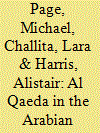

|
|
|
|
|
| Publication |
2011.
|
| Summary/Abstract |
Al Qaeda in the Arabian Peninsula has positioned itself at the vanguard of a media revolution in which terrorist groups both create and frame news events to an unprecedented extent. Through the publication of its e-magazine Sada al-Malahim (The Echo of Epic Battles), the organization has sought to mobilize both Yemeni and non-Yemeni Muslim, Arabic-speaking audiences to carry out violent jihad. This article utilizes the concept of collective action frames to analyze Al Qaeda in the Arabian Peninsula's media output, identifying the organization's grievance narratives, ideological justifications for violent actions, and means to strengthen its credibility among its intended audiences.
|
|
|
|
|
|
|
|
|
|
|
|
|
|
|
|
| 9 |
ID:
160478
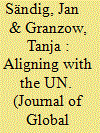

|
|
|
|
|
| Summary/Abstract |
Self-determination campaigns in the Global South have often been pursued through warfare. Since the 1990s, however, an increasing number of such movements have endorsed legalistic mechanisms of international law and the UN's core principle of nonviolence. We introduce the concept of UN-aligned self-determination movements for them. As a starting point to explain their occurrence, we examine two major cases: The Peaceful Southern Movement (Hirak) in Yemen and the Movement for the Actualization of the Sovereign State of Biafra (MASSOB) in contemporary Nigeria. Our analysis combines theories on political opportunities, diffusion, and framing from social movement, civil resistance, and armed rebellion research. We observe that since the end of the Cold War the rule of law, role of the UN, and norms of nonviolent conflict resolution have been strengthened in the international system. We argue that this has given self-determination movements in the Global South new opportunities for claims-making: Facing repressive governments, the leaders of Hirak and MASSOB have successfully aligned their movements with the UN by diffusing its core principles to the local struggle through resonant collective action frames. Thereby, our study contributes to understanding the diffusion of nonviolence in the international system, in particular in self-determination campaigns, and directs attention to the rise of UN-aligned self-determination movements.
|
|
|
|
|
|
|
|
|
|
|
|
|
|
|
|
| 10 |
ID:
102415
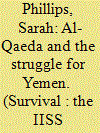

|
|
|
|
|
| Publication |
2011.
|
| Summary/Abstract |
In October 2010, explosives packed in the toner cartridges of two printers shipped from Yemen travelled on several passenger and cargo flights before their discovery in Britain and Dubai, hours before they were set to detonate. The incident followed the attempted bombing of an American passenger jet on Christmas Day 2009, traced to al-Qaeda in the Arabian Peninsula (AQAP), several of whose leaders have found refuge in Yemen's tribal periphery. This leadership has been targeted by US air-strikes, and Western policymakers have stressed the need for the Yemeni government to increase its capacity to deploy both carrots and sticks to undermine radical jihadism.
|
|
|
|
|
|
|
|
|
|
|
|
|
|
|
|
| 11 |
ID:
188452
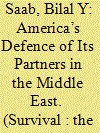

|
|
|
|
|
| Summary/Abstract |
The main factors American presidents typically consider before committing military resources to protect a partner include perceived US national interests, US domestic politics, the nature of the attack itself, the aggressor’s military capabilities and the possibility of escalation. An additional factor is the ability and willingness of the partner to conduct joint and combined operations with the United States and possibly others. This is critically important in the Middle East. As Washington prioritises the Indo-Pacific and Europe, US military forces will draw down in the Middle East and be less able to intervene promptly. To maintain strong regional deterrence, security arrangements between the United States and its Arab partners should be reconfigured to ensure that they can confront regional threats, Iran’s in particular, without immediate American assistance. The will require American advice and assistance in creating sustainable and effective joint forces.
|
|
|
|
|
|
|
|
|
|
|
|
|
|
|
|
| 12 |
ID:
163928
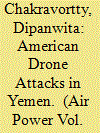

|
|
|
| 13 |
ID:
125075
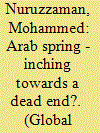

|
|
|
|
|
| Publication |
2013.
|
| Summary/Abstract |
A high degree of pessimism continues to hold a strong grip over the enthusiasts of democracy in the Arab world. In the last more than two years, the popular uprisings for social and political change have stalled in Bahrain, Syria, and Yemen. In Egypt, Libya, and Tunisia, where the populace succeeded in toppling the authoritarian rulers, the situation did not change that much. Violence, conflicts, and killings of political opponents disturbingly characterize all the Arab countries affected by the popular uprisings. In Syria, the government and opposition forces are locked in a deadly conflict with neither side being able to make a decisive breakthrough. The Egyptian army overthrew the country's first democratically elected government, headed by the Muslim Brotherhood, on 3 July 2013. On the whole, the success rate of democratization is so far disappointing. That begs the question whether the Arab popular uprisings for democratic change, what the media has conveniently dubbed the 'Arab Spring', are failing or still enduring.
|
|
|
|
|
|
|
|
|
|
|
|
|
|
|
|
| 14 |
ID:
129869
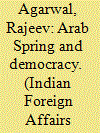

|
|
|
| 15 |
ID:
118883
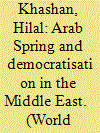

|
|
|
| 16 |
ID:
124946
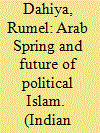

|
|
|
| 17 |
ID:
156718
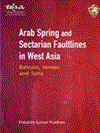

|
|
|
|
|
| Publication |
New Delhi, Pentagon Press, 2017.
|
| Description |
xii, 157p.hbk
|
| Standard Number |
9789386618054
|
|
|
|
|
|
|
|
|
|
|
|
Copies: C:2/I:0,R:0,Q:0
Circulation
| Accession# | Call# | Current Location | Status | Policy | Location |
| 059232 | 320.56/PRA 059232 | Main | On Shelf | General | |
| 059233 | 320.56/PRA 059233 | Main | On Shelf | General | |
|
|
|
|
| 18 |
ID:
185467
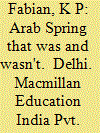

|
|
|
|
|
| Publication |
DelhI, Macmillan Education India Pvt. Ltd., 2022.
|
| Description |
xii, 308p.hbk
|
| Standard Number |
9789354552755
|
|
|
|
|
|
|
|
|
|
|
|
Copies: C:1/I:0,R:0,Q:0
Circulation
| Accession# | Call# | Current Location | Status | Policy | Location |
| 060190 | 320.56/FAB 060190 | Main | On Shelf | General | |
|
|
|
|
| 19 |
ID:
111597
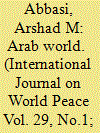

|
|
|
| 20 |
ID:
156491


|
|
|
|
|
| Summary/Abstract |
What began as a popular uprising against a corrupt dictatorship has been overtaken by a struggle for regional supremacy, with the Middle East’s poorest country as sacrificial victim
|
|
|
|
|
|
|
|
|
|
|
|
|
|
|
|
|
|
|
|
|